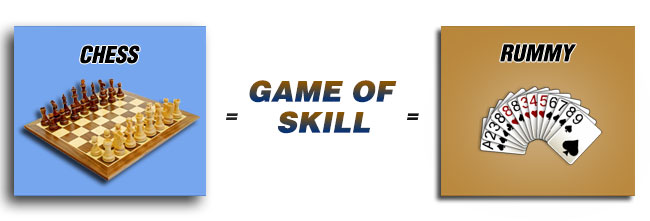Is it gambling just because it’s a game involving playing cards?
By Malay Kumar Shukla, Senior VP Finance, Legal & Compliance
Pieces in a game of chess have different characteristics/capabilities that allow players to think innumerable moves and combinations. This makes chess an exciting and a highly competitive game of skill. What if we were to invent a game with the same chess pieces that merely required a player to guess the colour of the piece hidden in a closed hand? Would that make this new game (call it “Guess the colour”) still be a game of skill? Obviously not! Just because you use chess pieces in any game doesn’t make that game a skilled game like the game of chess.
Exactly is the case with playing cards. Let’s understand the use of playing cards in games. There are 52 Cards in a pack having different values and suits. Just like in the game of chess, these suits/values allow for a number of ways to use cards for playing games that involve high levels of skill.
There is no doubt that these can be used for unskilled gambling activities as well. Playing cards in the gambling world are the equivalent of smartphones in the normal world – hand-held, flexible and discreet. Set up your gambling stall under a tree and finish some rounds of gambling even before a passer by peeps in.
So let’s admit that there is prejudice against playing cards. But let us also agree that we will not let this prejudice stop us from taking an objective view about card games which involve substantial skill.
There are two games that are popularly played with playing cards – Rummy and Bridge – which involve much more than guess work. Rummy involves picking and retaining cards that appear relatively more useful than other cards in order to make sets and sequences faster than other players. It is also about strategically retaining cards that might not be useful in making sets and sequences but would potentially prevent other players from completing their sets and sequences. A lot of probability, calculation goes into doing this exercise and those who understand the game know it very well how much skill goes into winning a round of rummy.
Last but most importantly, the skill game litmus test… check to see whether you can lose the game against something inanimate – say a bottle of water – and you will be surprised by the simplicity of this answer. You can actually lose a game of Teen Patti against a bottle of water! Challenge the bottle to a game of rummy and trust me, you can never lose.
The wise lawmakers of yore understood all this and built a strong distinction in law between treating activities which are based on skill and those based on chance. Chance based games that required no skill and could be played with a risk of causing great financial loss to oneself were made criminal whereas activities which were based on skill were protected as legitimate commercial and entertainment activities.
Things get slightly legal here. In 1957, a constitutional bench of the Supreme Court nicely articulated this distinction between chance and skill based activities. These constitutional bench decisions (referred to as the “two Chamarbaugwala cases” here) were also relied more recently in the case of Dr. K R Lakshman v. State of Tamil Nadu, (1996 SCC (2) 226) where it reaffirmed this distinctions and the constitutional protection to games of skill.
Some relevant portions of this 1996 ruling are extracted below:
“The new Encyclopaedia Britannica defines gambling as ‘The betting or staking of something of value, with consciousness of risk and hope of gain on the outcome of a game. Game of skill, on the other hand – although the element of chance necessarily cannot be entirely eliminated – is one in which success depends principally upon the superior knowledge, training, attention, experience and adroitness of the player. Golf, chess and even Rummy are considered to be games of skill.’ As such a game of chance is one in which the element of chance predominates over the element of skill, and a game of skill is one in which the element of skill predominates over the element of chance. It is the dominant element – “skill” or “chance” – which determines the character of the game.”
“This Court, therefore, in the two Chamarbaugwala-cases, has held that gambling is not trade and as such is not protected by Article 19(1) (g) of the Constitution. It has further been authoritatively held that the competitions which involve substantial skill are not gambling activities. Such competitions are business activities, the protection of which is guaranteed by Article 19(1) (g) of the Constitution.”*
[[*Article 19(1)g is the fundamental right “to practise any profession, or to carry on any occupation, trade or business”]]
I do hope this piece clears all the doubts anyone may have had on Rummy being a game of skill or a gamble. I would be happy to answer any more questions on this. Please feel free to ask anything in the comments section. For personal queries, you can write on [email protected]
Go ahead and enjoy the game of rummy for its legal, safe and very entertaining.
Subscribe to our blog for timely, exciting updates
About The Author
RummyTu
RummyTu is an ultimate destination to Play Rummy Cash with friends, family and millions of rummy players. Enjoy the Best Rummy Experience!





Leave a Reply